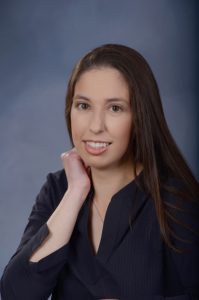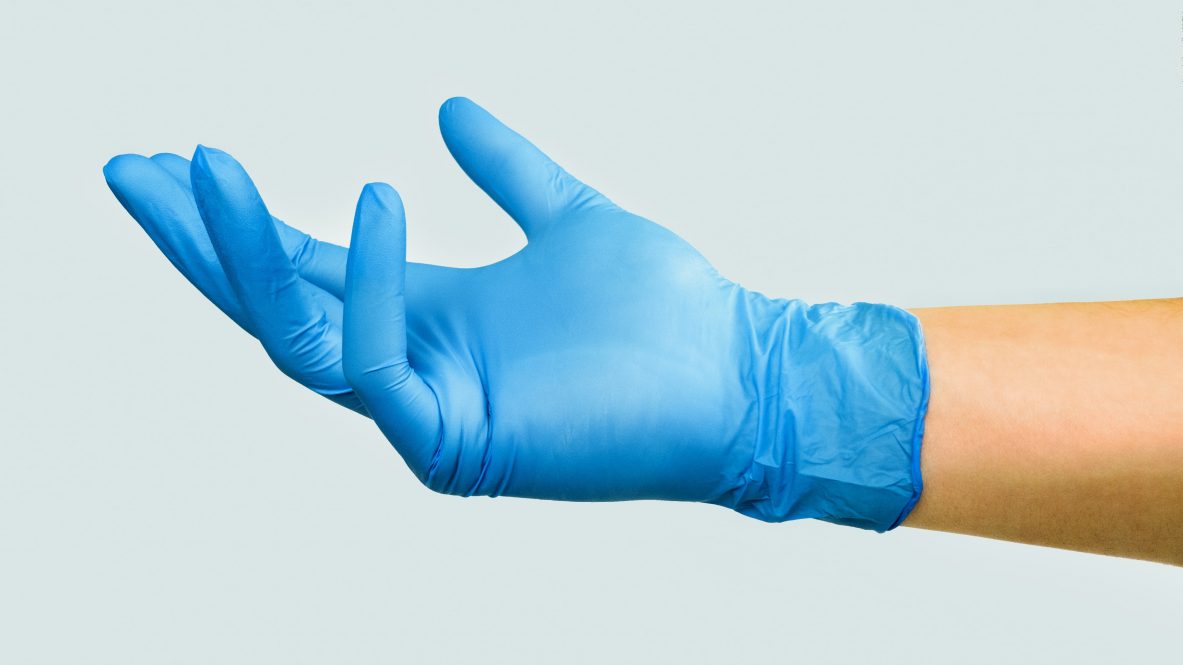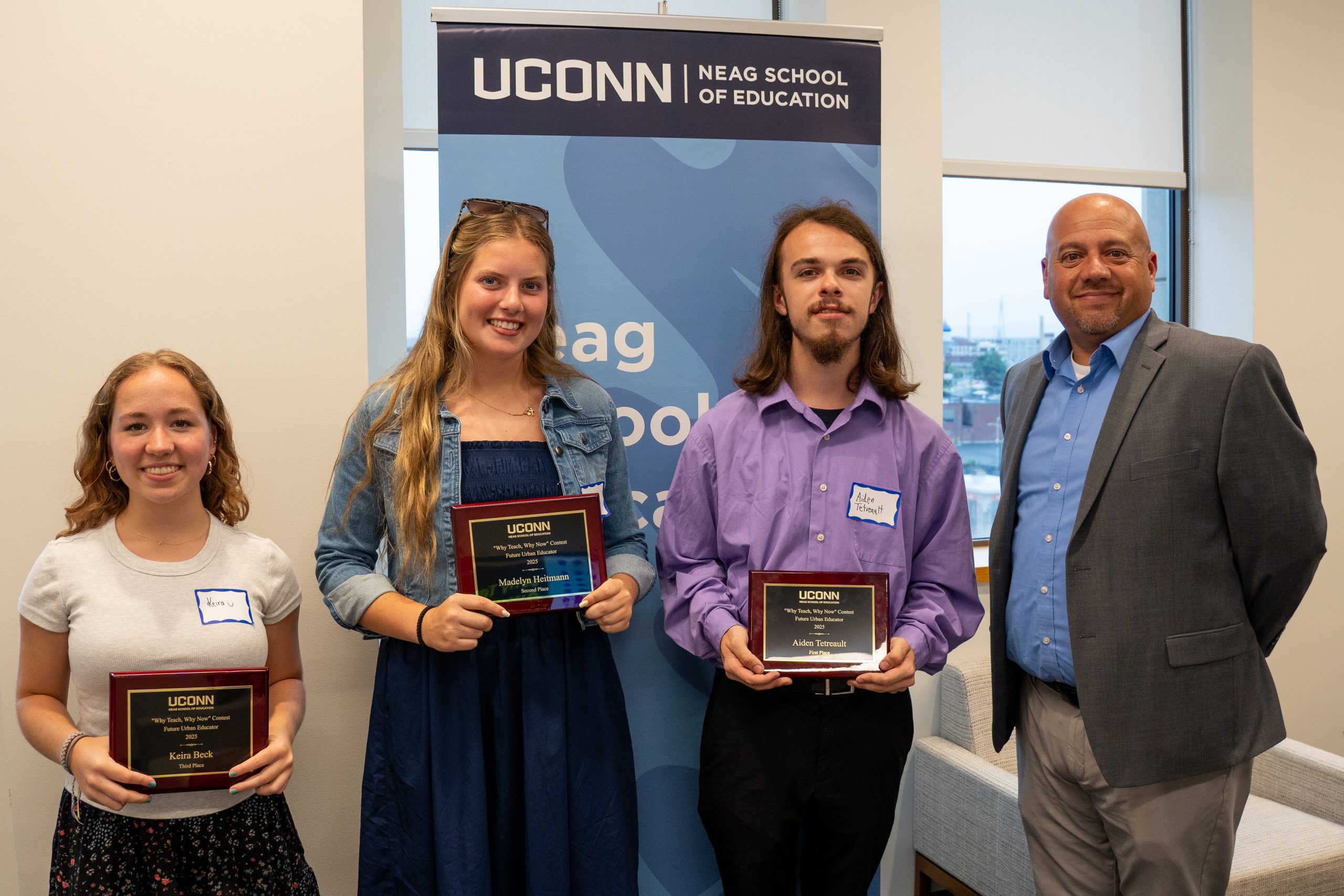Less than 5% of medical device patents awarded by the U.S. Patent and Trademark Office in the last 50 years are associated with a nurse. But recent School of Nursing graduate Ellen Quintana ’21 (NUR) has become one of the few, as she was awarded a non-provisional patent for her ReduSeal system this spring.
The dispensing technology works with a standard box of disposable gloves to help reduce the number of gloves that comes out each time you pull from the box. It cuts down on glove waste and cost, which have been growing expenses for health care providers recently due to COVID-19 precautions. The invention even saves time for busy nurses and health care professionals.
“This issue first came to my attention during a lab for one of my chemistry classes my first year at UConn,” says Quintana. “No one could get just one glove out of the box, and there were gloves everywhere. We were told that once they fell out, we couldn’t put them back; it was really wasteful.”
At that time, she turned to her nursing professors and mentors for guidance: Did they encounter this problem in their workplaces as well?
“Professor Carrie Eaton, who at the time was a graduate assistant with the Nursing Learning Community, told me her workplace just placed garbage cans under the glove boxes that hang on the wall to catch any extras,” Quintana says. “That got me thinking, why don’t we stop this problem from happening and how could I redesign the glove box?”

She had no idea that her inquisitive spirit would lead her down a path of innovation for the entirety of her time at UConn, introducing her to many of the University’s resources and opportunities for entrepreneurs along the way.
Outside of class, Quintana connected with School of Nursing alumna and then-adjunct professor Christine Meehan to cultivate her idea and prototype. Meehan is a health care entrepreneur, angel investor, and led the School’s innovations activities at the time. She encouraged Quintana to apply for UConn’s IDEA Grant Program, which awards funding to support student-designed and student-led projects. To Quintana’s surprise, she was one of the projects selected that year.
“I didn’t expect to get that as a first-year student!” Quintana says. “I knew I couldn’t tackle this project alone, so over that summer, I created an interdisciplinary team.”
In partnership with the School of Engineering’s Senior Design program, Ellen was able to bring her vision to life with the first generation of prototypes, which she subjects to what she calls “pull tests” — seeing how many gloves come out of the box at once with the prototype in place. Eaton, who then directed the School of Nursing’s Clinical Simulation Learning Center after finishing her Ph.D., helped Quintana set up time in the simulation labs to conduct her pull tests.
As with most inventions, each prototype and round of testing led to adjustments, new prototypes, and more testing. Quintana added an independent study to her course schedule every semester since the spring of her first year, allowing her to have time dedicated to developing her invention. It also provided structure for her innovation activities and created mentoring relationships with faculty.
In 2019, Quintana met two people who would be an important part of the rest of her innovation journey. In fall 2018, the School of Nursing had welcomed Tiffany Kelley to its faculty as the DeLuca Foundation Visiting Professor for Innovations and New Knowledge in Nursing. She joined Meehan in spring 2019 in guiding Quintana’s work and independent study.
Kelley hosted a Health Innovation Weekend that fall for both nursing and non-nursing students and faculty. Over the course of that weekend, Quintana met Kelsey MarcAurele ’22 (NUR).
“I noticed Kelsey and Ellen sitting next to each other all weekend,” Kelley says. “A few months later, when Ellen wanted to apply for a VentureWell E-Team grant, she was in need of adding a team member to the application. I immediately thought of Kelsey because of that weekend and watching their interactions.”

MarcAurele had transferred to UConn that fall, drawn to its rich research environment, and attended the Health Innovation Weekend because it fit her interests and she wanted to meet other students.
“I always knew that I wanted to do something in research and innovation,” MarcAurele says. “It was a little overwhelming joining Ellen’s project in the middle, because Ellen has very big ideas. Now I understand where her brain goes and, over time, we were able to get to know each other better.”
The two students got to work applying for the VentureWell grant, which ended up awarding them $5,000, and then set their sights on applying for UConn’s Innovation Quest, which encourages student innovators to pursue their ideas and get funded for it, in spring 2020.
“There’s a balance that I’ve seen emerge between Kelsey and Ellen,” Kelley says. “Kelsey has taken on a project manager role, staying abreast of milestones and deadlines while Ellen has been the decision-maker on design and her overall vision for next steps. They’ve worked well together.”
MarcAurele saw a flyer at a bus stop advertising Innovation Quest, a competition for students across the University’s campus, the same day that Kelley and Quintana also happened to be discussing it.
“I said to Ellen, ‘Maybe we should just do it then’,” MarcAurele says. “‘You heard about it, I saw it the same day, it’s a sign, we should just go for it.’ And we ended up placing second, which was very unexpected. It was a very big blessing.”
That second-place finish at Innovation Quest came with $10,000 to put toward ReduSeal. Despite the COVID-19 pandemic that emerged that spring, Quintana and MarcAurele kept pushing themselves to refine and perfect the invention. They realized it was more useful than ever before, as the pandemic required more and more health care and non-health care workers to depend on gloves to keep them safe.
Quintana created a limited liability company, called RN Efficiently, in summer 2020, and she and MarcAurele applied for the Johnson & Johnson Nurses Innovate Quickfire Challenge that fall, becoming one of 10 finalists invited to pitch their product.
But March 2021 brought the biggest success of all: Quintana being awarded a non-provisional patent for ReduSeal.
Back in summer 2018, Meehan had introduced Quintana to the Intellectual Property Clinic at UConn Law, which guides Connecticut-based entrepreneurs through intellectual property filing at a reduced rate. With the clinic’s help and advice, Quintana skipped the usual first step of applying for the temporary provisional patent and instead filed for the standard non-provisional patent in spring 2019.
Two years later, she received an early graduation gift from the U.S. Patent and Trademark Office when she found out she had been awarded her patent. But she says it’s just the beginning.
“I’m looking for opportunities to license the product, now that I have intellectual property and the patent,” Quintana says. “I want to strategically license the product so hospitals can save money, reduce waste, and hopefully save time for nurses. Nurses shouldn’t have to clean up gloves.”
She will be working as a registered nurse in the emergency department at Hartford Hospital starting in August, but says she wants to continue to work on ReduSeal and for it to be successful. She credits UConn for nurturing her entrepreneurship and exposing her to opportunities she may not have found elsewhere.
The School of Nursing, in turn, recognized her at Commencement in May by presenting her with the Regina M. Cusson Student Healthcare Innovations Award. Named for the School’s eighth dean, who served from 2011 to 2016 and positioned the School as a leader in innovation, the award honors a student who has shown demonstrable commitment and interest in being an example for leading health care innovation through the School of Nursing.
“Ellen leveraged many resources across UConn’s ecosystem for innovation and entrepreneurship,” Kelley says. “Her progression over the years is a good example of how to integrate what UConn has to offer students who identify a problem they want to solve and advance it during their studies. Additionally, the educational experience can only be a benefit to their professional development and growth after their time at UConn.”
Quintana agrees and says a lot of what she has learned will also help her be a better nurse.
“UConn and the School of Nursing helped connect me to resources I otherwise wouldn’t have access to,” she says. “This process taught me problem-solving and critical thinking skills, when experiments didn’t go well, or I struggled to build prototypes. I learned to have patience and how to communicate with others. I started this as a first-year student, and I’ve seen myself grow because I’ve had to learn how to reach out to people and who to reach out to with mentored support from faculty at UConn. As an ER nurse, you have to know what resources are available to help your patients and now I can be the best advocate possible for them.”
Follow the UConn School of Nursing on Facebook, Instagram, Twitter, or LinkedIn.



